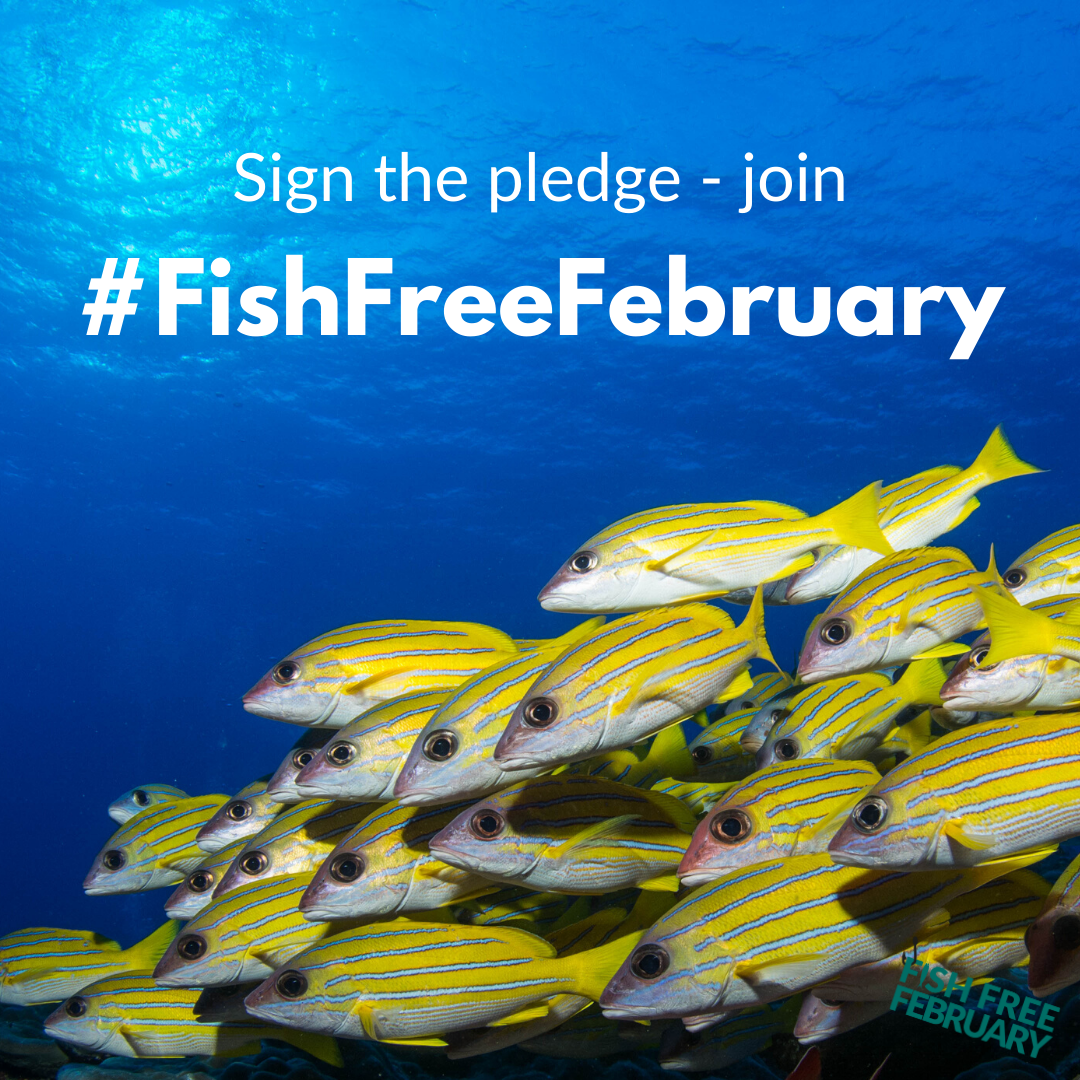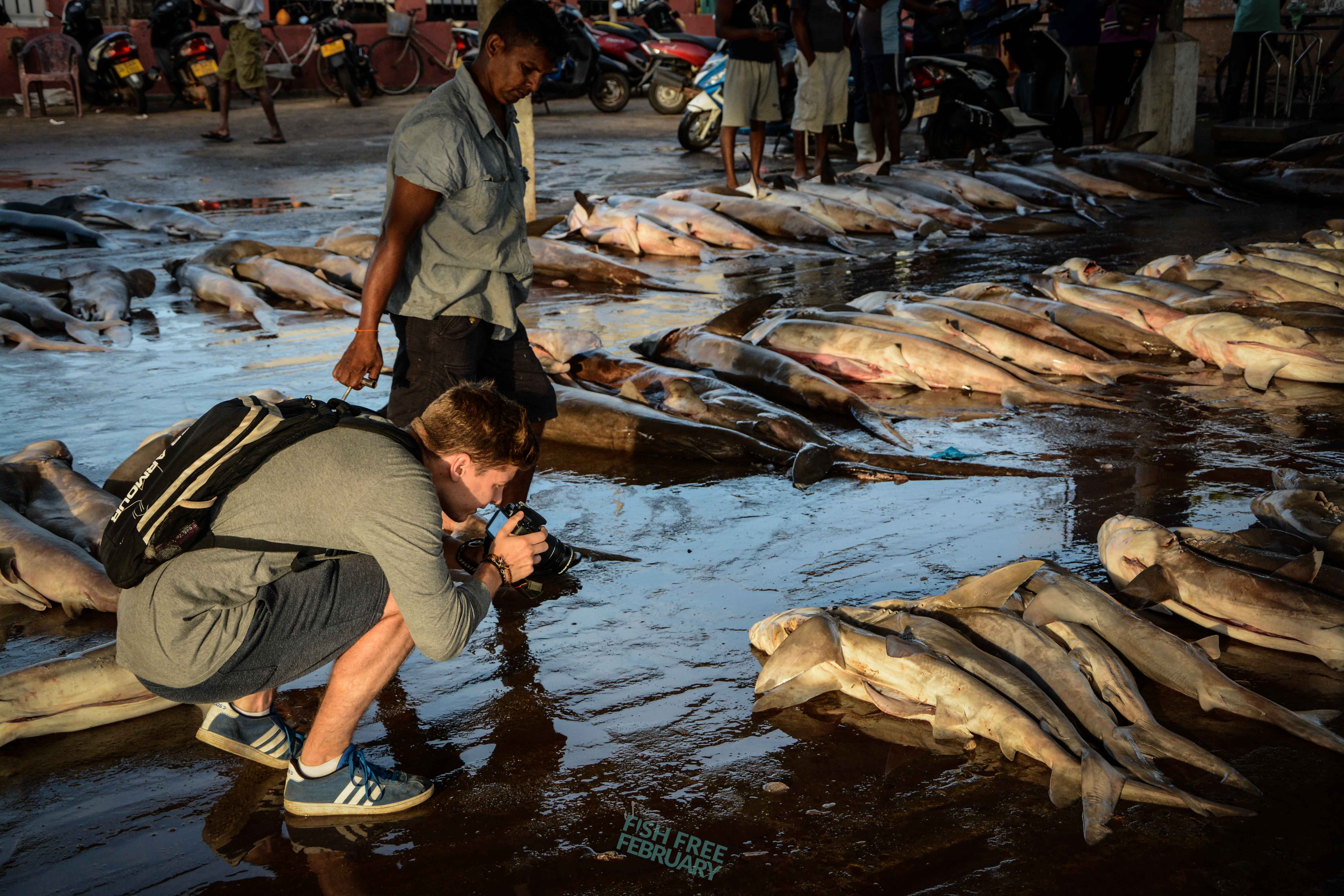Fish Free February - The world is speaking up about the dark realities of the meat and dairy industries, why are fish being ignored?
Marine biologist Simon Hilbourne from the Manta Trust and Oceans Festival UK are launching a new campaign called Fish Free February, challenging the public to protect our oceans by removing seafood from their diet for 29 days.
Fish Free February is a campaign organised by international marine conservationists to reduce our collective impact on the oceans and the life that they hold, in a simple and effective way. Throughout the month of February, #FishFreeFebruary will encourage people to discuss the wide range of issues associated with industrial fishing practices, putting the wellbeing of our oceans at the forefront of dietary decision-making.
Not all fishing practices are bad - well-managed, small-scale fishing that uses selective fishing gears can be sustainable. However, when it comes to the majority of our seafood, this is not the case. We mostly rely on industrial fisheries which often prioritise profit over the wellbeing of our planet, resulting in multiple environmental challenges. Fish Free February will shed light on these challenges, create wider discussion around these issues, and offer solutions.
So what are the problems with fishing?
Overfishing: We are taking more than our fair share of fish, so much in fact that populations can’t repopulate fast enough. 90% of global fish stocks are fished to their maximum or overfished with an estimated 1-2.7 trillion fish caught annually for human consumption. Compare that to the 63 billion mammals and birds killed each year for food and it becomes clear that there aren’t plenty more fish in the sea.
Plastic pollution: Discarded fishing nets make up 46% of the plastic in the Great Pacific Garbage Patch, far more than plastic bags or straws. This is when fishing gear is abandoned at sea. This might be due to breakages, losing items overboard and in some cases old or broken fishing gear is purposely dumped into the sea. Just because there is not fisherman attached, doesn’t mean those nets, hooks and lines aren’t still lethal. Large pieces of plastic pollution like fishing nets break down into microplastics which are then ingested by marine life. In 2018 a study found 100% of wild and shop-bought mussels to contain plastic.
Destructive fishing practices: Fishing often doesn’t just kill the species that you want to eat, bycatch and non-specific fishing methods (such as dynamite, long lines, trawlers, gill nets and electric pulse nets) mean that other species end up dead as well. Dolphins, sharks, turtles, corals and many other fish species – they’re all caught up in this mess as well.
Mislabelling: That’s right, fish isn’t always what it says on the tin. A study by Oceana found that as much as one third of seafood samples in the US were not what they were labelled as in restaurants and stores. This can have huge implications on the environment and also human health, but ultimately it highlights that we need far more stringent regulation and monitoring in this industry.
Farmed fish (aquaculture): 40% of the seafood we eat is farmed, but creating seafood farms often involves destroying existing habitats and therefore has a high carbon footprint. Chemicals and diseases associated with seafood farming also impact the surrounding waters and eventually affect wild populations.
Food waste: The Scottish farmed salmon industry is highly wasteful, with around 20% of fish never reaching harvest due to mortalities and escapes during production, according to its own figures. If this level of waste remains unchecked, a large proportion of the wild fish sourced to feed its salmon is also being wasted.
Human rights: In regions of the world such as South-East Asia, forced labour and human trafficking is rife within the fishing industry. It is very possible that the imported fish in our supermarkets has made its way from the sea to the shelves as a result of modern-day slavery.
Illegal fishing: Companies in the fishing industry don’t always follow the rules. As you might imagine, it can be fairly challenging to monitor the high-seas and currently illegal, unregulated and unreported fishing is widespread. This exacerbates the negative impact of all of the issues associated with industrial fishing and means that companies continue their dirty work and there is no justice for our oceans.
How will Fish Free February change any of that?
Fish Free February aims to result in one, or several, of the following outcomes:
Participants will…
- Commit to eradicating seafood from their diet for 29 days and focus on plant-based, sustainable alternative ways of eating.
- Consciously reduce the amount of seafood in their diet to limit the degree of their personal impact. If continuing to consume seafood after February, people are encouraged to purchase items that are certified by an independent sustainable fishing moderator, such as the Marine Stewardship Council. People can also focus on trying to purchase seafood from small-scale, local and sustainable fisheries.
- Increase the discussion surrounding seafood and fishing practices, to increase the level of knowledge in public consciousness.
- Ask questions about where the fish they are being sold or served came from. Holding retailers and restaurants responsible for the products they sell will put pressure on them to source seafood from sustainable fisheries.
#FishFreeFebruary will send a clear message of protest against current standards of fishing and seafood farming. The ultimate goal is to generate a shift in the fishing industry and encourage a radical reduction in seafood consumption, opting for sustainable practices when fish is purchased. Additionally, Fish Free February will strengthen the connection that the public have with their food and to drive them to thoroughly consider where it has come from and how it has made its way to their plate.
“The fact of the matter is humans are taking far too many fish and other marine species from the sea. We simply must reduce the number of fish being caught. The best way to do that is to stop or greatly reduce eating seafood.” – Simon Hilbourne, Manta Trust Media & Communications Manager.
“We have the opportunity to tackle overfishing, plastic pollution and ecosystem collapse through the very simple act of eating less fish. If you weren’t quite able to commit to Veganuary or want another opportunity to do your part for the planet, please join the Fish Free February challenge!” – Jasmine Tribe, Founder of Oceans Festival UK.
“The ecological balance of our oceans is under huge stress from overfishing and I’ll be championing #FishFreeFebruary to highlight this. With such a vast amount of ocean plastic coming from the fishing industry this is also a great opportunity to highlight the ‘hidden’ plastic pollution in our food chain.” - Natalie Fee, Founder of City to Sea and author of ‘How to Save the World for Free’.
Press release distributed by Pressat on behalf of Manta Trust, on Monday 3 February, 2020. For more information subscribe and follow https://pressat.co.uk/
Ocean Overfishing Conservation Marine Biology Climate Change Vegan Fish Free Charities & non-profits Environment & Nature Farming & Animals Food & Drink
Published By

info@mantatrust.org
https://www.mantatrust.org
Simon Hilbourne, Media and Communications Manager - simon@mantatrust.org
Visit Newsroom
You just read:
Fish Free February - The world is speaking up about the dark realities of the meat and dairy industries, why are fish being ignored?
News from this source:






